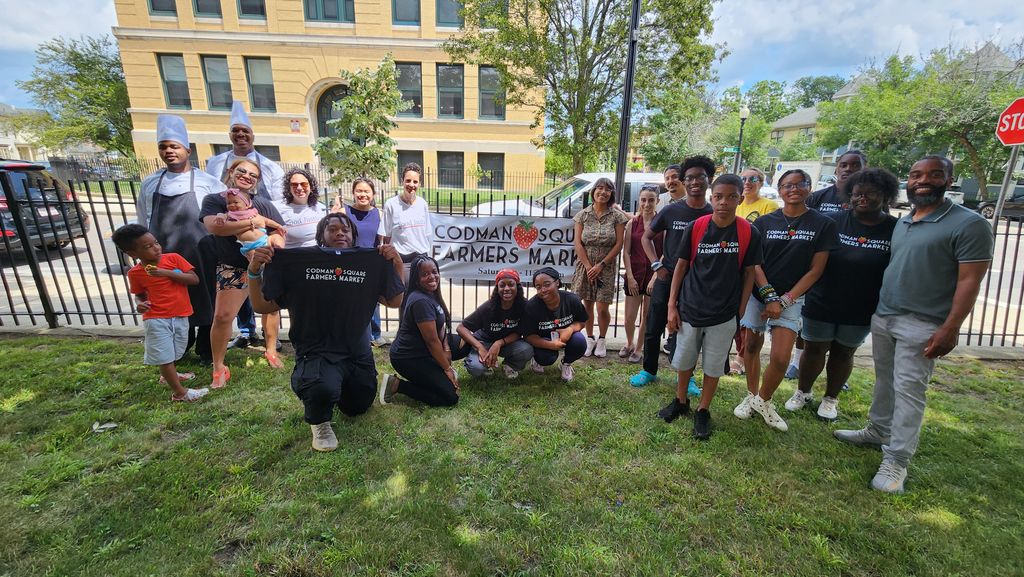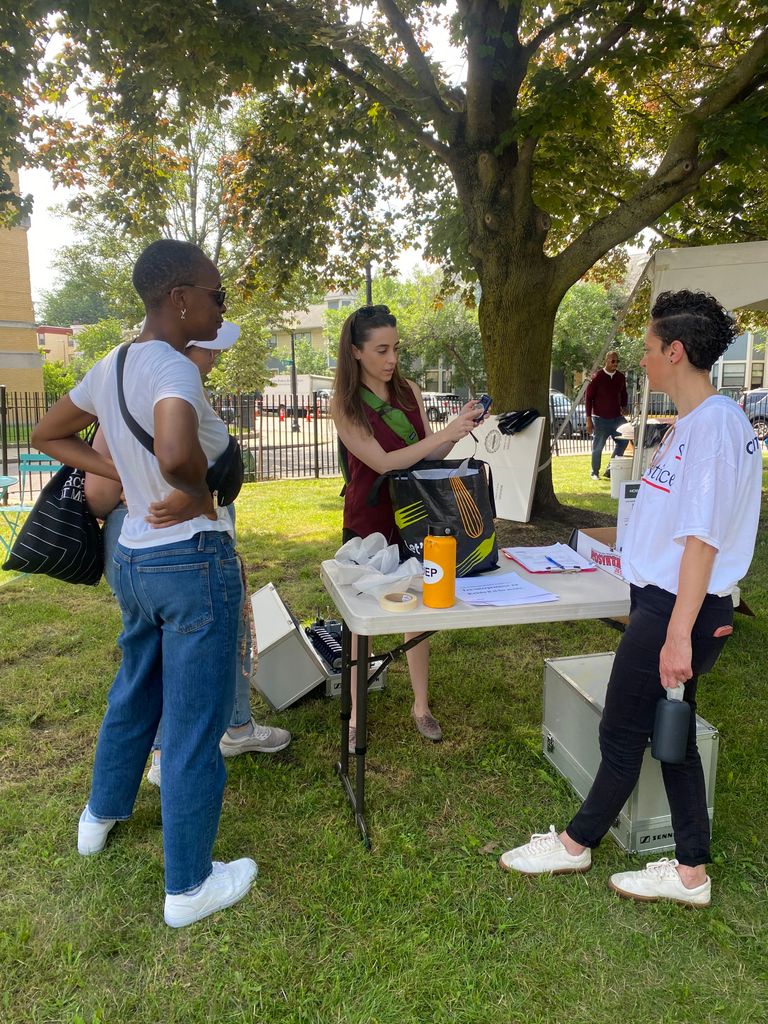Andrea Catania: My Summer with the Mayor’s Office of New Urban Mechanics
Andrea Catania (MET’24) was our summer 2023 Mayor’s Office of New Urban Mechanics (MONUM) Fellow.
Interested in this fellowship? Click here to learn more about our summer internship & fellowship offerings.

In December 2022, I initially scrolled by a summer job posting for something called “the New Urban Mechanics,” believing it was probably meant for engineers or city planners…not Gastronomy students like me.
Then, when I saw the position shared again in The Newbury Center newsletter, I took a closer look.
“Graduate students from any academic discipline or background are eligible to apply.”
Sounds like a winner.
Fast forward to February 2023, BU’s Initiative on Cities team conducted preliminary interviews with me. Another month goes by, and now the Mayor’s Office of New Urban Mechanics (MONUM) team has invited me to a 4-hour group interview with 20 people, during which I’ll have 3 minutes to teach them something. I chose a brief history of the world’s only upside-down traffic light, near where I grew up in Syracuse, New York. I connected it to the unconventional civic engagement of the people in the Irish diaspora.
It works. They selected me for the cohort of 6 Summer Fellows who will embark on an 8-week design sprint to make life better for the people of Boston.
In the subsequent months, I’m advised that the longer-term members of the MONUM team are pretty tight-knit and made up of bright, passionate people who drive change through what they call “explorer and integrator” mentalities. I would see this continually while with them—a true example of why diverse perspectives and interdisciplinary knowledge are key.
In the spring, I’m introduced to my fellow summer fellows, all graduate students from a wide variety of personal and educational backgrounds. I scan their bios… “MIT urban planning,” “Harvard curriculum development,” “Yale undergrad”… admittedly, I wonder if I’m supposed to be here. The thing about imposter syndrome is that it’s insidious. A tiny, internal voice, barely above a whisper, that leverages comparison to supplant joy with doubt.
Soon, our cohort started a group chat, and I began to learn how friendly, helpful, collaborative, and fun this crew would be. A dynamic that would remain intact as we navigated life at City Hall together.

On day one at City Hall, I was overwhelmed by the moment and resisted the urge to snap photos of everything, wanting to take it all in. We are given a tour of the building and a brief history of its brutalist design. Our tour led into orientation held in the MONUM studio space, also known as “M6”. Flanked by a floor-to-ceiling whiteboard wall and a view of historic downtown, it served as our home base and became a crucial space for creating community, building empathy, and sharing resources during the fellowship.

Up next were our individual project introductions; brief summaries of the projects became something we would repeat probably hundreds of times throughout the fellowship. Throughout the summer, we all worked hard to perfect the elevator pitches and learned to highlight various priorities, tailoring them to the listener. By the end, I could recite the other fellows’ projects nearly as well as my own.
We were introduced to our project sponsors and the MONUM staff members who would support our work throughout the summer. This is when I met Mark Araujo—an artist, designer, and educator who works as the Food Security Design Fellow. He introduces the project entitled “What’s Cookin’?” and explains that it is centered around reimagining what farmers markets could be. Mark describes the details of our project plan with a simultaneous ease and gravitas that inspires me instantly.
After a couple of days of getting acquainted, it’s time to get to work.

The first few weeks were meeting-heavy, and I became familiar with all of the key players related to the project. These included internal partners such as The Office of Food Justice, the Inspectional Services Department, the Boston Fire Department, and the Language & Communications Access team and external partners such as farmers’ market coordinators, vendors, chefs, and community group leaders.
As we continue working through the project, the objectives begin to fork into two distinct groups: “front of house” and “back of house.” The front-of-house work involves planning and executing pop-up cooking demonstrations at farmers’ markets. It requires us to confront exclusivity, elitism, and the transactional nature of farmers’ markets. In partnership with neighborhood organizations and market leaders, we designed the cooking demos to highlight local chefs and community desires with culturally relevant menus and accessible programming. The back of housework addresses logistics, infrastructure, policy, and food safety needs related to culinary programming. It involves removing some of the “mystery” (read: bureaucracy) behind the process for community organizations or residents to be able to fold food pedagogy into existing third spaces.
Once we are all really in the thick of our projects, roadblocks inevitably pop up. During a weekly recap, one MONUM team member cautions our group: “Avoid setting up enemies in your project.” Being associated with a progressive administration does not necessarily mean people or departments aren’t risk-averse. I work to abandon my perspective that it would be easier to get things done based on political alignment alone.
Relationship building becomes a key component of the role as many days are filled with coffee chats, skill shares, and what our cohort called “lunch with friends” (a rotating group lunch where we took turns introducing the group to other people we knew). As I mentioned, our group of summer fellows would develop a bond that made leaning on one another a helpful norm. This dynamic was similarly held with the full-time MONUM staff as they struck a perfect balance between availability and autonomy with us.
The summer fellowship culminates in a series of lightning talks, during which we each are given time to share our projects’ impacts for 100 or so key players at City Hall. Back to the original task of reimagining what farmers’ markets can be, I have just 5 minutes to run through how this work can transform farmers’ markets into less transactional and more holistic spaces. I lean into my culinary operations background and employ terms like mise en place and sense of urgency to describe how systemic issues require systemic solutions. I weave the tough messages in with the hope as I describe a path forward, incorporating a quote from Mayor Wu… “All of the easy problems have already been solved. Now, we must shift the culture to make meaningful change– quickly and boldly.”

During the lightning talk and in the preceding weeks, I mentally replayed a line that several MONUM team members had said: “You will need to be your project’s biggest advocate.” This advice swirled with other bits of wisdom from the MONUM team that reflect the great responsibility of a path of public service and civic engagement:
“Consider: does it really have to be this way? The work of human-centered design must be in relationship with the needs of the individual.”
“Lean on the realistic, but hold onto the blue sky.”
“Get City Hall out of City Hall. Every person who you talk to in the community is one less stranger in this world.”
“Always be advocating for your projects and ideas. You, as a person, are also the prototype.”
“Policy is about how people live their lives, not just the minutia of 1000-page codes that people don’t read.”
“Honor the skepticism of people; try to understand it.”
“We don’t presume to know the right thing to do, but we figure it out.”
In the final weeks of the program, I was approached by MONUM’s leadership about extending my time with the team for a couple more months. There is so much work to be done in the food space, and I believe strongly in the vision, so the choice is simple. Now, I can focus on supporting existing food security projects and food policy initiatives while continuing to learn from the people already doing the work.
At the beginning of this journey, and in the best way, I really had no idea what I was getting myself into. Eight weeks can be short, dense, and beautiful. MONUM taught me that you don’t have to know how to do something to do it and, as urban leaders, never stop considering how we show up in the community.